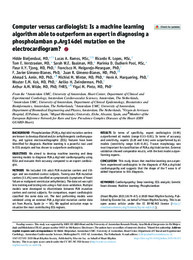Título :
Computer versus cardiologist: Is a machine learning algorithm able to outperform an expert in diagnosing a phospholamban p.Arg14del mutation on the electrocardiogram? |
Autor :
Bleijendaal, Hidde 
Melgarejo Meseguer, Francisco Manuel 
Gimeno Blanes, Francisco Javier
Gimeno Blanes, Juan 
Pinto, Yigal M.
Marquering, Henk 
Zwinderman, Aeilko H  |
Editor :
Elsevier |
Departamento:
Departamentos de la UMH::Ingeniería de Comunicaciones |
Fecha de publicación:
2020-09 |
URI :
https://hdl.handle.net/11000/30592 |
Resumen :
Background
Phospholamban (PLN) p.Arg14del mutation carriers are known to develop dilated and/or arrhythmogenic cardiomyopathy, and typical electrocardiographic (ECG) features have been identified for diagnosis. Machine learning is a powerful tool used in ECG analysis and has shown to outperform cardiologists.
Objectives
We aimed to develop machine learning and deep learning models to diagnose PLN p.Arg14del cardiomyopathy using ECGs and evaluate their accuracy compared to an expert cardiologist.
Methods
We included 155 adult PLN mutation carriers and 155 age- and sex-matched control subjects. Twenty-one PLN mutation carriers (13.4%) were classified as symptomatic (symptoms of heart failure or malignant ventricular arrhythmias). The data set was split into training and testing sets using 4-fold cross-validation. Multiple models were developed to discriminate between PLN mutation carriers and control subjects. For comparison, expert cardiologists classified the same data set. The best performing models were validated using an external PLN p.Arg14del mutation carrier data set from Murcia, Spain (n = 50). We applied occlusion maps to visualize the most contributing ECG regions.
Results
In terms of specificity, expert cardiologists (0.99) outperformed all models (range 0.53–0.81). In terms of accuracy and sensitivity, experts (0.28 and 0.64) were outperformed by all models (sensitivity range 0.65–0.81). T-wave morphology was most important for classification of PLN p.Arg14del carriers. External validation showed comparable results, with the best model outperforming experts.
Conclusion
This study shows that machine learning can outperform experienced cardiologists in the diagnosis of PLN p.Arg14del cardiomyopathy and suggests that the shape of the T wave is of added importance to this diagnosis.
|
Palabras clave/Materias:
Cardiomyopathy
Deep learning
ECG analysis
Genetic heart disease
Machine learning
Phospholamban |
Área de conocimiento :
CDU: Ciencias aplicadas: Ingeniería. Tecnología |
Tipo de documento :
info:eu-repo/semantics/article |
Derechos de acceso:
info:eu-repo/semantics/openAccess |
DOI :
https://doi.org/10.1016/j.hrthm.2020.08.021 |
Publicado en:
Heart Rhythm Volume 18, Issue 1, January (2021) |
Aparece en las colecciones:
Artículos Ingeniería Comunicaciones
|
 La licencia se describe como: Atribución-NonComercial-NoDerivada 4.0 Internacional.
La licencia se describe como: Atribución-NonComercial-NoDerivada 4.0 Internacional.
.png)
